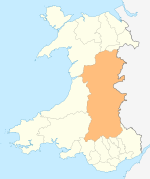|
Berriew
Berriew (Welsh: Aberriw) is a village and community in Montgomeryshire, Powys, Wales. It is on the Montgomeryshire Canal and the Afon Rhiw, near the confluence (Welsh: aber) with the River Severn (Welsh: Afon Hafren) at grid reference SJ185005, 79 miles (128 km) from Cardiff and 151 miles (243 km) from London.[citation needed] The village itself had a population of 283. [2] and the community also includes Garthmyl Hall and Refail. Buildings and architectureBerriew contains many architecturally important buildings. There are 103 Listed Buildings in Berriew of which 5 are Grade II*. Nearly a quarter of the listed building are connected with the Montgomeryshire Canal which runs across the parish to the S.E. of Berriew.[3] The most important of the listed buildings are Vaynor, which is probably the earliest brick built house of the mid-17th. century still standing in Montgomeryshire, and Glansevern, designed by the notable Shrewsbury architect Joseph Bromfield in the Greek Revival style and probably the best example of his work. There are two important timber-framed houses, the Vicarage which is dated 1616 and Lower Cil Farmhouse. An illustration of the Vicarage was used to illustrate the dustwrapper of the 1st edition of Peter Smith's important book on Welsh Vernacular Architecture ‘'Houses of The Welsh Countryside'’.[4] Another notable house is Garthmyl Hall, Berriew, which is by a leading 19th century designer and architect James Kellaway Colling. There are also a number of other larger houses in Berriew which include Brithdir, a timber-framed house which was considerably extended in the early 19th century; Pennant, a fine early brick house built in 1755; Rhiewport, a Regency house that is also probably by Joseph Bromfield, and Trwstllwelyn, a house with much early 18th century brickwork.  A sad loss was the fantasy Gothic villa of Bodheilin in Brithdir township, which was burnt down in 1906.[5] Timber framed and Cottage Ornée housesRather than the individual houses, Berriew is best remembered for its half timbered cottages which cluster around the churchyard and along the banks of the river Rhiew. There are further examples in the township of Refail. These can probably be attributed to the architect Thomas Penson. In the late 1830s, at the same time as Penson was working on remodelling Vaynor Park in Berriew for John Winder Lion-Winder, he was also remodelling and building houses in Berriew for the Vaynor estate.[6] As a result of his work Berriew developed as a village with many attractive Cottage Ornée houses. Some of these were rebuilt from earlier timber framed buildings, while others were built in a Tudor Revival style and are some of the earliest examples of Black-and-white Revival architecture. Penson's work can be recognised by the massive brick chimney stacks which have been added to the houses, the ornamental bargeboards to the gables and in some cases the black and white painting on the brick work to give the impression of timber framing.[7] Listed Buildings in Berriew
Other features of noteThe Berriew section of The Montgomery Canal has a number of important features including a restored lock and the Grade II listed aqueduct which carries the canal over the River Rhiw. It has four segmental arches and is the second-largest masonry structure on the canal. First opened in 1797, it was largely rebuilt in the 19th century and fully restored in the 20th century. GovernanceBerriew Community Council represents the interests of the local community and has 11 elected or co-opted members.[11] Berriew was also a county ward, electing one county councillor to sit on Powys County Council. Since 1995 the ward was represented by Independents, and by Cllr Dai Davies since 2008.[12][13] Following a boundary review, Berriew ward became Berriew and Castle Caereinion, after the Castle Caereinion community was added to it, effective from the 2022 local elections.[14] FacilitiesBerriew F.C. play in the Central Wales Football League North , the fourth level of the Welsh football league system. Mirror-artist and sculptor Andrew Logan bought the village squash courts and converted the building into a sculpture museum. There are two pubs in the village, The Talbot and the Lion Hotel. There is also The Horseshoes, a little way out of the village. The Berriew Show is a major attraction for the village and is held every August Bank Holiday Saturday. Attracting locals and people from miles around, it is a showcase for horticulture, agriculture and local craft and has thriving dog, horse and sheep shows. Best kept village in WalesBerriew has won this competition many times - although the scheme has now been discontinued. It was first won in 1970. Notable people
Literature
References
External linksWikimedia Commons has media related to Berriew. |
||||||||||||||||||||||||||||||||||||||
Portal di Ensiklopedia Dunia


